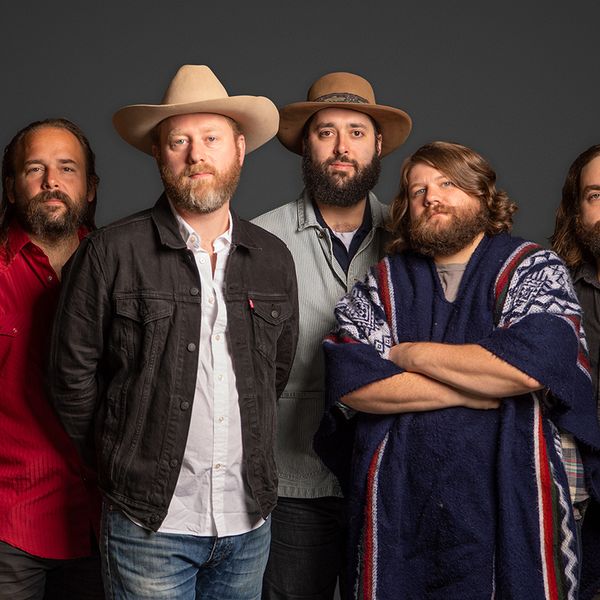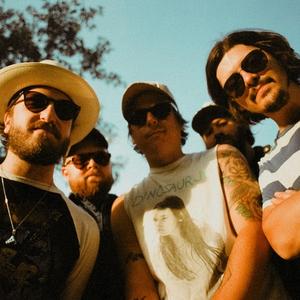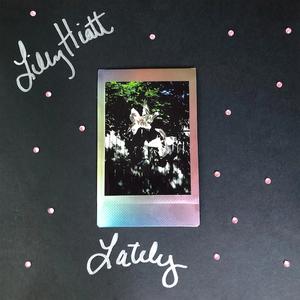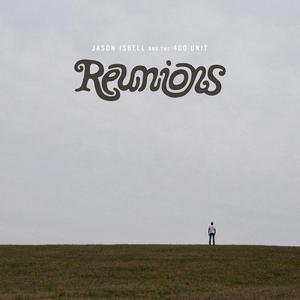




Link copied

Led by longtime friends and musical collaborators Andrew Nelson and Blount Floyd, Great Peacock have been carving out folky, southern rock ballads for close to a decade. However, during that time, the faces around them and instrumentation have changed, resulting in a drastic, albeit well-received sonic evolution from a folk trio into a roaring five-piece.
The band’s third album, Forever Worse Better, is easily their most polished and diverse to date, bringing together stripped-back, folk-leaning sounds of old on songs like ‘Heavy Load’ and ‘Learning To Say Goodbye’ with the southern roots/rock stylings of ‘All I Ever Do’, ‘Strange Position’ and ‘Old Man’.
Featuring special guests such as former American Aquarium pedal-steel guitarist Adam Kurtz and Jason Isbell & the 400 Unit's lead guitarist Sadler Vaden, it’s the first album the group have produced themselves, resulting in an extremely hands-on experience that allowed them to flesh out their songs more than ever before.
Last month at Bristol Rhythm & Roots Reunion, Holler caught up with Great Peacock bassist Frank Keith IV to talk about his side hustle as a music publicist, how he came to be involved with the band, their sonic evolution since then and more.

Even though I’ve seen you perform with Great Peacock several times now, I can’t help but think of you first and foremost as Frank Keith IV, publicist. How was it that you came into the band’s crosshairs?
I joined the group in 2017. I was living in Athens, Georgia, getting my undergraduate degree from the University of Georgia. After finishing school, I decided to stay there, play music and cultivate a scene. At one point, I shared some shows with the band and we kept in touch.
Eventually, I heard that their bass player quit; they were doing a run of shows with some hired guns.
I remember texting Aaron and telling him I was without a gig and would love to play bass if they still needed someone. He said yes and I’ve been playing with Great Peacock ever since.
How did you get into publicity work?
I actually went to school for journalism, although I never got a byline or worked a single day in the industry.
I remember being scared, because I was also trying to build a music career and didn’t think I could do both. It’s hard enough to make a name for yourself in either of those fields, much less both at once.
I guess I’m just lucky that my day job also revolves around music. Recently I found a way to do PR work in the van too. I bought an internet hotspot to use when my phone runs out of juice.
What else are you going to do when you’re on the road all day? Otherwise, I’d just be scrolling Twitter. This is a much better use of my time. I’m very fortunate to have a job that I can do on the road that also compliments my musical aspirations so well.
What are your thoughts on the band’s sonic evolution? Great Peacock started off as more of a folk trio, which they still hold onto elements of, but in many ways they've transformed into more of a southern roots/rock outfit, especially in the time you’ve been involved.
So, I joined the group literally a week after they recorded their second album, Gran Pavo Real, which was early in the transition you mentioned.
Prior to that, they had two acoustic guitars, an auxiliary guy on electric guitar, another guy on pedal steel, somebody playing fiddle and a drummer. When you’re on an indie budget, there’s a lot of mouths to feed and a lot of hotels to book every night.
So, to consolidate, Andrew and Blount tried experimenting with electric guitars, a bassist and a drummer for a bit. Those two have been making music together for years before this band.
We don’t play those older songs as much, because they aren’t as conducive to most of the bars and clubs we’re now playing in. That doesn’t stop people from coming to our shows and requesting those old, slow ballads all the time though.
Andrew has an amazing voice, but when you’re trying to win over a crowd at a bar or as an opening act at a festival, you’re more likely to have success when you turn the volume up.
I definitely agree with your sentiment about Andrew’s voice. One of my favorite aspects of the band is the dynamic between him and Blount. He seems very stoic most of the time, while Blount is much more outgoing and expressive during performances, not that Andrew doesn’t let loose a bit too.
They’re like Pancho and Lefty. They need their own comic strip, like Calvin and Hobbes. When the rock does come out of Andrew, you know he means it!
We all have such a blast playing together every single night. We always have each other’s backs and remind ourselves why we’re doing what we’re doing. Going on 10 years doing this, things can get pretty dark. Doubt starts to creep in. Everyone has day jobs. It’s tough out there.
Lots of people think this is all I do, but it’s like ‘No, I’m clocking in on Monday too, dawg’.
I’m glad you mentioned that, because I feel like one of the many themes running through the band’s latest album, Forever Worse Better, is not giving up on yourself, along with love lost.
This wasn’t meant to be a concept album, but the batch of songs that made it onto the record certainly tied in strongly to those themes. When we started sequencing the tracks, we began noticing the common threads between songs like ‘All I Ever Do’, a fresh break-up tune and the album’s lead track, and ‘Learning to Say Goodbye’, which is about learning that it’s OK to be alone. Everything in between those songs are existential thoughts.
You guys produced the album yourselves. Was that your first time doing so as a group? If so, how did that role alter this recording experience from time’s past?
It was, although I’ve never been a fan of that word ‘producer’. The way that I learnt to record is, if you’re not twisting the knobs and setting up the microphones, which a lot of people will call an engineer, that’s a producer.
But in Nashville and the music industry speak, the producer is the person with their arms crossed on the couch in the back going ‘That’s not a drum sound. That’s not a guitar sound. Go change it', while someone else in the room turns the knobs.
I’ve never been convinced that the person saying that always knows how to create that effect themselves. It’s the guy that knows how to set the sound that we care about.
I think we all felt like we had a bit more on the line with this record, if for no other reason than we’re all getting older. We wanted to make the most of this record, these songs and the experience of playing together, which we did.
We all have notes and commentary from the band’s first two albums, sonically speaking, but none of us have anything like that for this new one. This is how we’re going to approach all of our new music from now on. Even if we were to fly out to Los Angeles to record, we’re going to make sure it’s always us in the driver’s seat, making the decisions.
Do you feel as though, with the time that’s passed since releasing the record, the themes have taken on any new meaning or significance given the events of the last year, compared to when they were first crafted?
I think so. Andrew pretty much writes all the lyrics, and I’ve always thought he writes songs that are very accessible. I hope that anybody listening to them can relate to whatever they want the song to represent. It wasn’t the intention, but it certainly is appreciated.
Honestly, I get even more of a kick out of it when people draw other conclusions from a song than its intentions when it was first written. What I love most about music and art is the ambiguity of it all. To hear that means we’re doing our jobs, by creating a powerful, resounding message.
~~
Great Peacock’s latest album, Forever Worse Better, is out now via Soundly Music. Watch an acoustic performance of their song 'All I Ever Do' below.
Great Peacock are the featured artist on Holler’s New Country Artist Playlist. Subscribe and listen below.






